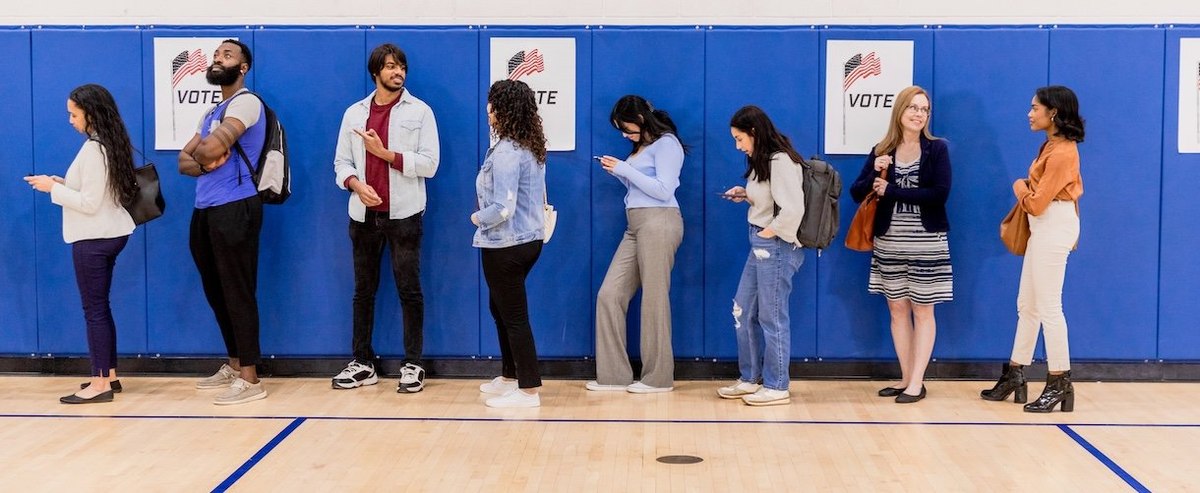The British government recently announced plans to lower the country’s voting age to 16 for national elections across the United Kingdom; 16-year-olds are already allowed to vote in many elections in Scotland and Wales. Could a similar change draw support in the United States?
The 26th Amendment guarantees the voting rights of Americans 18 and older, but it does not prohibit the federal government or individual states from setting a lower voting age. No state currently lets citizens under 18 participate in federal or state elections, although some cities in California, Maryland, and Vermont allow 16- and 17-year-olds to vote in local elections.
While the UK looks to lower its voting age, American presidents are entering unprecedented territory at the other end of the age scale. January’s presidential transition set two records: Donald Trump was the oldest president to start a new term, at 78, while Joe Biden extended his record as oldest president, at 82, as he exited the White House. The upward march of presidents’ ages has drawn some consternation. While the Constitution sets a minimum age to serve as president at 35, it sets no maximum age limit.
A YouGov poll on age limits and politics conducted in March finds that Americans are generally satisfied with current rules about voting: Most Americans would set a minimum voting age at 18 and would not like there to be a maximum. On the other hand, rules about the presidency are not at many Americans’ ideal point. Large shares of Americans would allow people under 35 to serve as president, and would set a maximum age limit to serve.
Most Americans would keep the voting age as is
Americans generally think that 18 is the right age to start voting. Most (56%) Americans say 18 should be the minimum age for voting in federal elections. This has been the voting age across the country since the 26th Amendment was ratified in 1971. Before that, many states did not allow citizens under 21 to vote. Few Americans would like to go back to those days: Only 19% of Americans would set a minimum voting age above 18. At the same time, few would like to change in the other direction: Only 25% of Americans would set a voting age below 18 or do away with the minimum voting age altogether.
Younger adults are more likely to support a lower voting age. About one-third (35%) of adults under 30 would like to see voting rights extended to those under 18, although even among this group of adults a greater share (47%) think 18 is the right minimum voting age. Older Americans are less supportive of a lower voting age. Americans who are 65 and older are more likely to say the minimum voting age should be raised (26%) than to say it should be lowered or eliminated (16%), but the majority (58%) would keep it at 18.
Majorities of Democrats (66%) and Republicans (54%) and about half of Independents (51%) favor a voting age of 18. Lowering or eliminating the minimum voting age is most likely to be supported by Independents (32%) and Democrats (25%), while it is less popular with Republicans (15%). Conversely, raising the voting age draws the most support from Republicans (31%) and less from Independents (17%) and Democrats (9%).
We also asked Americans if they believe there should be a maximum voting age — meaning anyone older would not be allowed to vote. If the U.S. did disallow voting past a certain age it would be highly unusual; a rare exception is the Vatican, where cardinals who are 80 or older are ineligible to vote for a new pope.
Americans are overwhelmingly opposed to setting a maximum voting age: 82% say there should not be a maximum age limit for voting, while only 18% say there should be one. Younger adults are more likely than older adults to support such a move, but this is a minority view within each major age group: 25% of adults under 30 would set a maximum voting age, while only 7% of Americans 65 and older would set one. Support for a maximum age limit is similarly low among Democrats (19%), Independents (17%), and Republicans (18%).
Americans are more supportive of laws that would result in younger presidents
While majorities of Americans think laws about the voting age should stay as they are, there is more appetite for change in laws about age requirements to serve as president.
Nearly half (44%) of Americans believe that people under 35 should be able to serve as president. Only 23% believe 35 is the correct age requirement, while 33% believe the minimum age should be 36 or older. While there is more support for lowering the presidential age requirement than there is for raising it, the median American would set the age requirement at 35, where it is now.
Just as younger adults are more likely to support lowering the voting age, they're also more likely to favor lowering the minimum age for presidents About two-thirds (68%) of adults under 30 believe the minimum age to serve as president should be younger than 35. In older age groups, this is a minority view. Americans 45 and older are more likely to say that the minimum age to serve as president should be raised than to say that it should be lowered.
On the other hand, there are not large partisan differences on the minimum age of the presidency. There is more support for lowering the minimum age to serve as president than for raising it among Democrats (40% to 33%), Independents (46% to 31%), and Republicans (45% to 34%). In all three groups, the median respondent would keep the minimum age at 35.
While the median American would not lower the minimum age to serve as president, a large majority of Americans would support another change that could result in younger presidents: setting a maximum age limit on the presidency. Three-quarters (75%) of Americans believe that there should be a maximum age to serve as president.
Younger adults are more likely to support setting a maximum presidential age limit, although Americans of all ages are far more likely to support than oppose such a change. 80% of adults under 45 favor setting a limit, as do 70% of older Americans.
With a 78-year-old Republican in the White House at the time of the survey, Republicans are less likely to support a maximum age limit for the presidency, though it draws majority support from Americans regardless of party identification: 88% of Democrats, 73% of Independents, and 64% of Republicans support a maximum age. Republicans were more likely than Independents or Democrats to support age limits for elected officials in YouGov polls fielded in 2022 and 2023, when the president was Joe Biden, a Democrat who was around age 80 at the time.
Americans are more divided about where to set an age cap for the presidency. Most Americans (54%) would set a maximum presidential age at 79 years or younger. Smaller shares of Americans believe that a limit should be set at an age of 80 or older (21%) or that there should be no maximum age at all (25%).
Younger adults are more likely to support a younger age limit for presidents, though the difference is modest. While 59% of adults under 30 support an age cap at 79 or younger, 50% of Americans 65 and older say the same.
Democrats are far more likely than Republicans to support a younger age limit for presidents. Majorities of Democrats (75%) and Independents (53%) believe the maximum age to serve as president should be 79 or younger. Only 34% of Republicans believe the same. The median Republican would support a maximum age limit to serve as president, but would set that limit above age 80 — older than Trump.
— Taylor Orth and Carl Bialik contributed to this article
See the results for this YouGov survey
Related articles and surveys:
- More than half of Americans support a maximum age limit for elected officials
- If Americans could choose, many would set common age limits around where they are now
- How old is too old for president?
- Majorities of Americans support age limits for Congress and mental-competency tests
- Should there be a maximum age limit for elected officials to hold office?
- Americans are increasingly concerned about Donald Trump’s age and fitness for office
- Many Americans would like to raise the driving age and lower the drinking age
Methodology: This YouGov poll was conducted online on March 17 - 19, 2025 among 1,140 U.S. adult citizens. Respondents were selected from YouGov’s opt-in panel to be representative of adult U.S. citizens. The sample was weighted according to gender, age, race, education, 2024 presidential vote, 2020 election turnout and presidential vote, baseline party identification, and current voter registration status. Demographic weighting targets come from the 2019 American Community Survey. 2024 presidential vote, at time of weighting, was estimated to be 48% Harris and 50% Trump. Baseline party identification is the respondent’s most recent answer given around November 8, 2024, and is weighted to the estimated distribution at that time (31% Democratic, 32% Republican). The margin of error for the overall sample is approximately 4%.
Image: Getty
What do you really think about President Trump, American politics in general, and everything else? Share your reality, join the YouGov panel, and get paid to share your thoughts. Sign up here.










